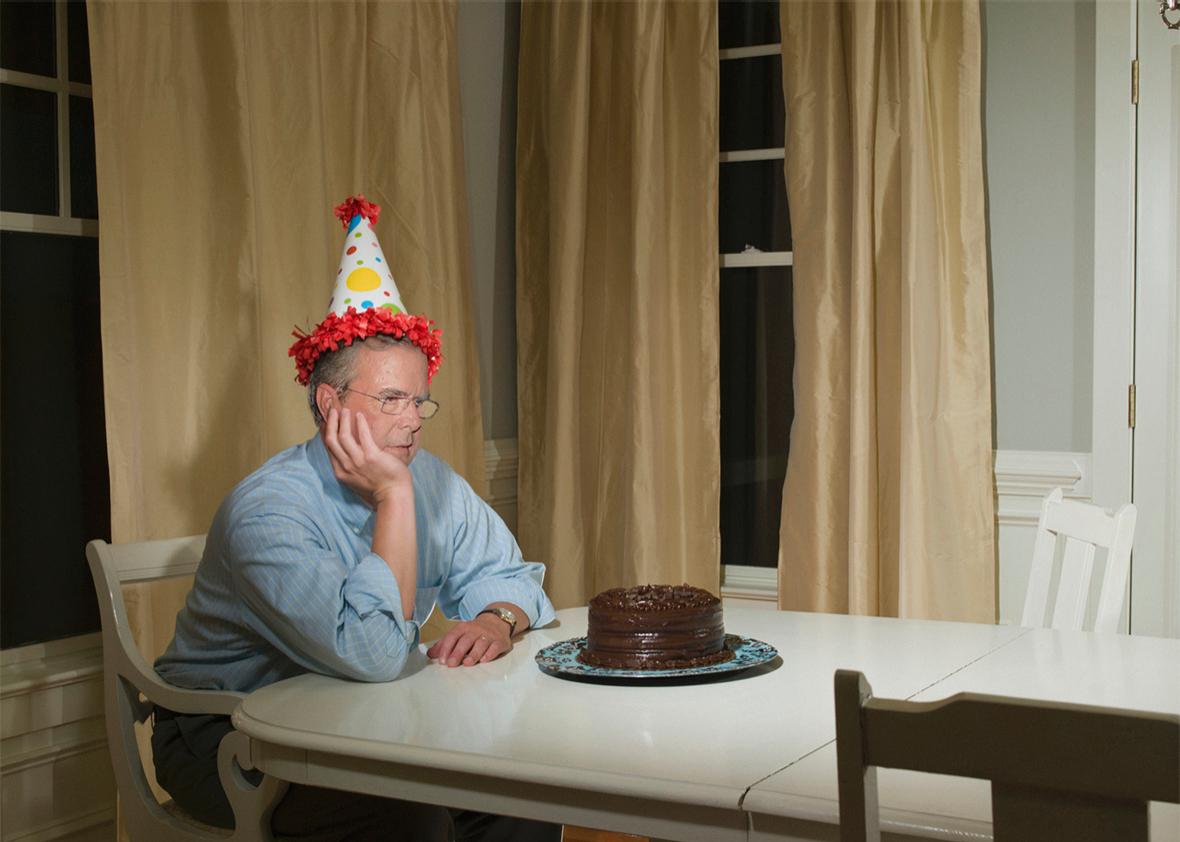Mike Murphy finds it all very funny that people think Jeb Bush is in trouble.
The head of Bush’s $100 million super PAC, Right to Rise, considers most political punditry this cycle to be stupid. Conceded. But both the stupid and occasional non-stupid pundits all agree on one thing: Things aren’t going well for Bush, and one cannot assume that the old rules governing Republican presidential nominating contests will inevitably save him.
Murphy outlined his thinking in a rare extended interview with Bloomberg Politics. Why? Most practically, to signal Right to Rise’s thinking to the official Bush campaign and leery donors. Or, in Murphy’s words: “[W]e thought it would be good to kind of go through our theory of the race in a more distributed way.”
His theory is lacking. Nowhere, between all his mockery, does he get to the heart of the matter: why people don’t like Jeb Bush right now, and how Right to Rise intends to change that.
“What I find is we’re in this funny casino of the pre-season now,” he says, “where the complete sum of pundit knowledge in this race, with a few rare exceptions, is based on national polling that in my view is completely meaningless.” Zuh? There will always be a fair share of bad national poll coverage. If there’s more of it this time, Murphy can blame the Republican National Committee and its media partners for pegging debate participation to national polling status. But it’s not like Bush is only doing badly in national polls that don’t matter, anyway. He’s doing poorly in polls of early states, too. Bush is doing lousy in Iowa. That’s fine: Bush is one thing and Iowa Republicans are a whole other thing. But he’s also performing lousy in New Hampshire, a state he has spent an extraordinary amount of time in and has been advertising in. He is not leading in Florida, his natural firewall, or South Carolina, the GOP establishment’s traditional firewall for their chosen representative.
How important are early state polls? They can and do fluctuate along with everything else. Murphy, whether he means to or not, implies that early state polls are important, because he dramatically lowers Bush’s expectations in those early states based on how poorly things have been going. That, as the Washington Post’s David Weigel points out, is really the most eye-popping exchange in the interview: Murphy argues that Bush doesn’t need to win any states for the first 45 days of contests in order to win the nomination—people will know that he has the money to compete for the long haul, the “little guys” will flame out, and then the real race will begin later on in big-state, winner-take-all races.
It’s an arguable theory. Murphy is not the first to suggest that super PACs like his extend the primary map and downplay the traditional importance of the early states. But Murphy is supposed to be the one arguing that, writ-large, the old rules of nominating—in which party voters eventually ditch flings and flock to the more electable, “establishment” pick—still apply. Arguing that the eventual nominee need not win (or even place!) in Iowa, New Hampshire, or South Carolina this time around punctures his underlying premise—that this time isn’t all that different.
This is second-order stuff, anyway. Whether the rules are different or not, the central problem for Bush is the same: Voters simply do not care for him.
Being relatively liked by human beings who vote in elections is an important first step toward winning elections. We need not pay much attention to Bush’s top-line number in national polls, but we can look to his favorability ratings to see what sort of space he has to work with. Monmouth University’s latest national poll, released this morning, finds Bush at 5 percent nationally. Whatever. Skip to the favorability ratings, though, and the picture somehow looks even more grim. Of the six candidates’ whose favorables were polled among Republicans, Bush is the only one underwater—at 37 to 44 percent. This is indicative of the trend, and it corresponds with what any person paying vague attention to the news has seen.
Murphy is just spinning, same as anyone else who works for Bush. Of course there are going to be some gaps in what he says versus what is really happening. But if he’s going to prattle on about how the media has invented a sorry state of affairs for Bush’s candidacy that isn’t backed by evidence, well, we hate to break it to him.
If anything, the media has given Bush too much credit due to his last name and his family’s reputation for winning presidential nominations. Who in their right mind would believe that this visibly poor campaigner, who’s fifth-placing it every which way, whose fundamentals show little room for growth, who’s out-of-step with the temperament of his party’s voters, whose cash advantage isn’t really in another league anymore, and whose general election viability isn’t looking so hot is going to be restored by the natural laws of presidential nominating? Only the stupid, stupid media would believe that this guy has a shot.
